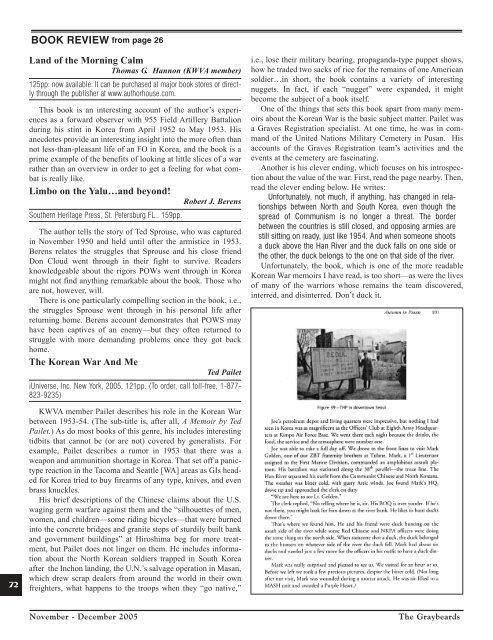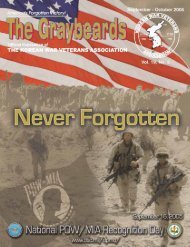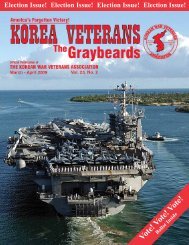The Graybeards Nov/Dec 2005 - Korean War Veterans Association
The Graybeards Nov/Dec 2005 - Korean War Veterans Association
The Graybeards Nov/Dec 2005 - Korean War Veterans Association
Create successful ePaper yourself
Turn your PDF publications into a flip-book with our unique Google optimized e-Paper software.
BOOK REVIEW from page 26<br />
Land of the Morning Calm<br />
Thomas G. Hannon (KWVA member)<br />
125pp: now available. It can be purchased at major book stores or directly<br />
through the publisher at www.authorhouse.com.<br />
This book is an interesting account of the author’s experiences<br />
as a forward observer with 955 Field Artillery Battalion<br />
during his stint in Korea from April 1952 to May 1953. His<br />
anecdotes provide an interesting insight into the more often than<br />
not less-than-pleasant life of an FO in Korea, and the book is a<br />
prime example of the benefits of looking at little slices of a war<br />
rather than an overview in order to get a feeling for what combat<br />
is really like.<br />
Limbo on the Yalu…and beyond!<br />
Robert J. Berens<br />
Southern Heritage Press, St. Petersburg FL.. 159pp.<br />
<strong>The</strong> author tells the story of Ted Sprouse, who was captured<br />
in <strong>Nov</strong>ember 1950 and held until after the armistice in 1953.<br />
Berens relates the struggles that Sprouse and his close friend<br />
Don Cloud went through in their fight to survive. Readers<br />
knowledgeable about the rigors POWs went through in Korea<br />
might not find anything remarkable about the book. Those who<br />
are not, however, will.<br />
<strong>The</strong>re is one particularly compelling section in the book, i.e.,<br />
the struggles Sprouse went through in his personal life after<br />
returning home. Berens account demonstrates that POWS may<br />
have been captives of an enemy—but they often returned to<br />
struggle with more demanding problems once they got back<br />
home.<br />
<strong>The</strong> <strong>Korean</strong> <strong>War</strong> And Me<br />
Ted Pailet<br />
iUniverse, Inc. New York, <strong>2005</strong>. 121pp. (To order, call toll-free, 1-877-<br />
823-9235)<br />
i.e., lose their military bearing, propaganda-type puppet shows,<br />
how he traded two sacks of rice for the remains of one American<br />
soldier…in short, the book contains a variety of interesting<br />
nuggets. In fact, if each “nugget” were expanded, it might<br />
become the subject of a book itself.<br />
One of the things that sets this book apart from many memoirs<br />
about the <strong>Korean</strong> <strong>War</strong> is the basic subject matter. Pailet was<br />
a Graves Registration specialist. At one time, he was in command<br />
of the United Nations Military Cemetery in Pusan. His<br />
accounts of the Graves Registration team’s activities and the<br />
events at the cemetery are fascinating.<br />
Another is his clever ending, which focuses on his introspection<br />
about the value of the war. First, read the page nearby. <strong>The</strong>n,<br />
read the clever ending below. He writes:<br />
Unfortunately, not much, if anything, has changed in relationships<br />
between North and South Korea, even though the<br />
spread of Communism is no longer a threat. <strong>The</strong> border<br />
between the countries is still closed, and opposing armies are<br />
still sitting on ready, just like 1954. And when someone shoots<br />
a duck above the Han River and the duck falls on one side or<br />
the other, the duck belongs to the one on that side of the river.<br />
Unfortunately, the book, which is one of the more readable<br />
<strong>Korean</strong> <strong>War</strong> memoirs I have read, is too short—as were the lives<br />
of many of the warriors whose remains the team discovered,<br />
interred, and disinterred. Don’t duck it.<br />
72<br />
KWVA member Pailet describes his role in the <strong>Korean</strong> <strong>War</strong><br />
between 1953-54. (<strong>The</strong> sub-title is, after all, A Memoir by Ted<br />
Pailet.) As do most books of this genre, his includes interesting<br />
tidbits that cannot be (or are not) covered by generalists. For<br />
example, Pailet describes a rumor in 1953 that there was a<br />
weapon and ammunition shortage in Korea. That set off a panictype<br />
reaction in the Tacoma and Seattle [WA] areas as GIs headed<br />
for Korea tried to buy firearms of any type, knives, and even<br />
brass knuckles.<br />
His brief descriptions of the Chinese claims about the U.S.<br />
waging germ warfare against them and the “silhouettes of men,<br />
women, and children—some riding bicycles—that were burned<br />
into the concrete bridges and granite steps of sturdily built bank<br />
and government buildings” at Hiroshima beg for more treatment,<br />
but Pailet does not linger on them. He includes information<br />
about the North <strong>Korean</strong> soldiers trapped in South Korea<br />
after the Inchon landing, the U.N.’s salvage operation in Masan,<br />
which drew scrap dealers from around the world in their own<br />
freighters, what happens to the troops when they “go native,”<br />
<strong>Nov</strong>ember - <strong>Dec</strong>ember <strong>2005</strong><br />
<strong>The</strong> <strong>Graybeards</strong>

















